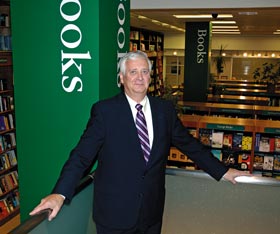For more archives, go to the Advance Archive/Search Page.
Manager of Co-op Bookstore Tuned In to Campus Trends
Bill Simpson’s job is to stay one step ahead of his customers. At the moment that means trying to figure out if campus bookstores will still be selling textbooks five or 10 years into the future.
 |
Bill Simpson, president and general manager of the UConn Co-op, has more than 34 years of experience in collegiate retailing. |
Photo by Dollie Harvey |
Simpson, president and general manager of the UConn Co-op, one of the largest of the 4,000 college bookstores in the nation, says perhaps textbooks of the future will be in digital form, with students paying to download the books themselves rather than purchasing them in a bookstore.
But a lot of details remain to be worked out before that will happen.
“Students expect things on the Internet to be free,” Simpson says. “They are accustomed to downloading music, for instance. But publishers as content owners want to be paid. And faculty authors are concerned about controlling the content of a book. A textbook in digital format could be altered, the order of the chapters changed, or the material presented in a way that the author did not intend it to be.”
Digital books might have advantages though, he says, adding that content is one of them. Some years ago, he says, a company named Voyager, now out of business, came out with a digital series. Students who opened the CD-Rom could click on a passage in Macbeth, for instance, and check the meaning of a word or the historical background of a city.
“It really added a lot of information,” Simpson says. “But most people are not comfortable reading more than a few screens of copy.”
Trends are something Simpson has to tune into. Some years ago, the fad was custom textbooks. Faculty chose chapters from various books, added journal articles and other materials, and the Co-op obtained the copyright permission to merge it all into a custom textbook. “Supposedly this was going to be a revolution,” he says. “But the cost factor made it prohibitive.”
Simpson and his staff also have an interesting task figuring out how many students in a particular course will purchase a book; how to get students used books, which provide a tremendous savings; and even how much Husky merchandise to buy.
“We are finding that we need more Husky merchandise,” Simpson says. “Because of the success of the athletic teams, students and others are very interested in insignia merchandise.”
He says the store has also added more room décor and gift items. Greeting card sales are not what they used to be, however, apparently because students no longer rely on “snail” mail but rather on instant messaging and e-mail.
The Co-op is ranked 18th in the Retail Alliance Inc., a strategic alliance of large university bookstores that cooperate on technology and other cost-saving measures. Its sales volume is among the largest in the country. Sales at the Co-op are up since the store moved from its location across from the library to the new two-story facility across from the School of Business.
“The most significant change since we moved to the new building,” Simpson says, “is the pattern of who visits. We are next to the South Parking Garage, so we are very available to people with access to cars. That means more off-campus people and more non-students,” including fans who are on campus to attend athletic events, especially basketball games.
The store is one of only about 20 co-operatives in the country and typically gives half its operating profit back to members as an end-of-the-year rebate. It has satellite stores at each of the regional campuses, at the law school, the Health Center, and in downtown Hartford, and a mail-order business called Husky Direct, which markets insignia items via a catalogue or the Internet.
Simpson, who has both a bachelor’s and a master’s of business administration from the University of Massachusetts, has been at the Co-op since 1983. His college bookstore experience began as a student at UMass, where he moved through the textbook division into general books and to general merchandise, before becoming the merchandise manager. He has also been the director of the bookstore at Rochester Institute of Technology and served as the president of the College Stores of New England.
Active in several professional organizations and the Chamber of Commerce Inc., based in Willimantic, Simpson is also on the University-Town Relations Committee and is a member of the Mansfield Business and Professional Association.
With more than 34 years of experience in collegiate retailing, Simpson reports to the Co-op’s elected board of directors, most of whom are students. The board determines how much of the profit to return to its members, and also oversees how the store is run.
“Customers and owners are one and the same,” Simpson says. “It is a unique opportunity to market to people who are involved in the store and who have a vested interest in its success.”

